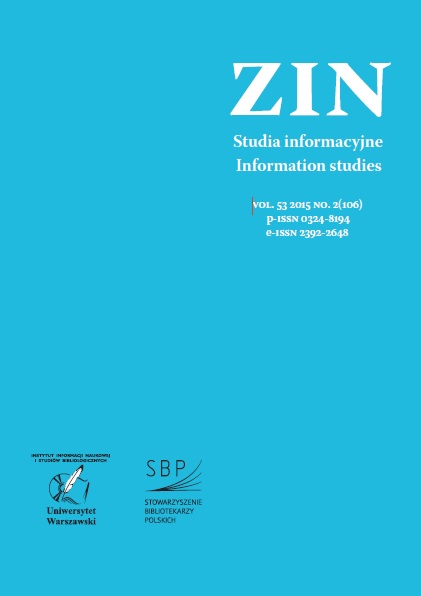Transactional Reading Theory in Information Organization
Transactional Reading Theory in Information Organization
Author(s): Marek NahotkoSubject(s): Library and Information Science
Published by: Wydawnictwa Uniwersytetu Warszawskiego
Keywords: Information organization; Theory of text genres; Transactional theory of reading
Summary/Abstract: PURPOSE/THESIS: The article is intended to present some opportunities to apply the text genres theory, transaction theory and cognitive schemata theory in the Information organization. The text genre should be understood here as a mental schema developed and distributed as a result of repeatable transactions with the text. The bibliographic (catalog) record can be treated as a text of a specified genre, which enables the scientists to research the social transactions both between the text and the author (information organizer, librarian) and the text and the recipient (information system user, library). All research presented in the article may be helpful to describe changes in transactions related to the changes in information technologies. METHODS: The article contains the description of changes to the transactions of information organization resulting from the application of new information technologies, that is the transformation of bibliographic record text into cybertext and their genres into cybergenres. RESULTS AND CONCLUSIONS: Any changes to the technologies used in the information organization lead to the development and enhancement of the users transactions with the text of the record in order to increase the search capabilities and simplify the methods of transaction implementation. ORIGINALITY/COGNITIVE VALUE: The approaches presented in the article are based on the theories of: cognitive schemata (constructivism), text genres (Miller and Andersen) and transactions (Dewey, Rosenblatt), applied in the analysis of bibliographic (catalog) records, treated as texts built in a specified convention arising from the repeatable transactions between information organizers and users. This point of view helps place those texts in an appropriate place among texts present in the scientific discourse.
Journal: Zagadnienia Informacji Naukowej – Studia Informacyjne
- Issue Year: 53/2015
- Issue No: 2 (106)
- Page Range: 84-105
- Page Count: 22
- Language: English

